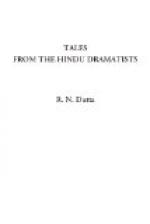Krishna’s embassy is unsuccessful, and he effects his return only by employing his divine powers against the enemy. All the chiefs are summoned by the trumpet to prepare for battle.
Before day-break, Bhanumati repeats, to her friend and an attendant, a dream in which she has beheld a Nakula or Mungoose destroy a hundred snakes. This is very ominous, Nakula being one of the Pandavas, and the sons of Kuru amounting to a hundred. Duryodhana overhears part of the story, and at first imagines the hostile prince is the hero of the vision. He is about to burst upon her, full of rage, and when he catches the true import of the tale, he is at first disposed to be alarmed by it, but at last wisely determines to disregard it.
For, by Angira it is sung, the aspect of the planets, dreams and signs, meteors and portents, are the sports of accident, and do not move the wise. Bhanumati offers an arghya of sandal and flowers to the rising sun to avert the ill omen, and then the king appears and soothes her.
Their dialogue is disturbed by a rising whirlwind from which they take shelter in a neighbouring pavilion. The mother of Jayadratha, the king of Sindhu, then appears, and apprises Duryodhana that Arjuna has vowed, if sunset finds Jayadratha alive, he will sacrifice himself in the flames. His wrath is especially excited by the death of his son Abhimanyu, in which that chieftain had borne a leading part. Duryodhana laughs at her fears and those of his wife, and despises the resentment of the Pandavas. He observes, that this was fully provoked by the treatment which Draupadi received by his command, when in the presence of the court and of the Pandavas, she called out in vain for mercy. Duryodhana then orders his war-chariot and goes forth to the battle. Up to the period of the contest, the following chiefs have fallen, Bhagadatta, Sindhuraja, Angadhipa, Drupada, Bhurisravas, Somadatta, and Bahlika.
Ghatotkacha is also slain, and Bhima is about to avenge his fall, on which account Hirimba, the queen of the Rakshasas and mother of Ghatotkacha, has ordered goblins to be ready to assist Bhimasena.
Drona is seized by Dhrishtadyumna and slain. Aswatthama, the son of Drona, appears armed and is overtaken by his father’s charioteer who tells him of the treachery by which Drona was slain, having been induced to throw away his arms by a false report that his son Aswatthama had perished, and been then killed at a disadvantage. Aswatthama’s distress is assuaged by his maternal uncle Kripa, who recommends him to solicit the command of the host from Duryodhana.
In the meantime, proud Kerna, the friend and ally of Duryodhana, fills the mind of the Kuru chief with impressions hostile to Drona and his son, persuading him that Drona only fought to secure Aswatthama’s elevation to royal dignity, and that he threw away his life, not out of grief, but in despair at the disappointment of his ambitious schemes. Kripa and Aswatthama now arrive and Duryodhana professes to condole with Aswatthama for his father’s loss. Kerna sneeringly asks him what he purposes, to which he replies:—




